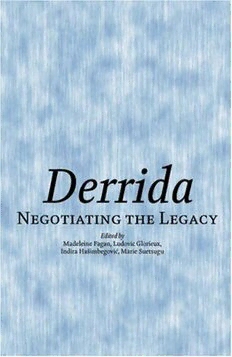
Derrida: Negotiating the Legacy PDF
257 Pages·2007·1.161 MB·English
Most books are stored in the elastic cloud where traffic is expensive. For this reason, we have a limit on daily download.
Preview Derrida: Negotiating the Legacy
Description:
The death of Jacques Derrida in 2004 represented a major interruption in contemporary intellectual life. This death calls for an engagement with Derrida's work and an attempt to understand his legacy. Such a discussion is fraught with tension between remaining faithful after death and putting Derrida's writing to work in new directions, posing challenges and exposing limitations. In short this legacy is, necessarily, a negotiation. The aim of this book is to grapple with this specific theme and to explore the implications of Derrida's death for the future of critical thought itself. The authors demonstrate that there is no single way to adopt or inherit Derrida's thought. Rather, through their engagement with contemporary themes within Politics and International Studies, Philosophy, Literary Studies and Postcolonial Studies, each chapter illuminates the degree to which on-going reflection, radical critique, and above all radical self-critique are demanded by deconstruction. This book provides the key starting point for any serious assessment of what the implications of the work of one of the twentieth century's most influential thinkers might be.Key Features: The first interdisciplinary text of its kindFeatures original work from some of the world's most eminent Derridean scholars including Richard Beardsworth, Christina Howells and Christopher NorrisIncludes chapters which explore the relationship between Derrida and key contemporaries such as Sartre, Nancy, Heidegger, Blanchot, Deleuze, Levinas and Habermas (04/1/08)
See more
The list of books you might like
Most books are stored in the elastic cloud where traffic is expensive. For this reason, we have a limit on daily download.
